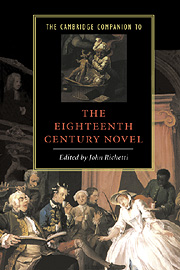Book contents
- Frontmatter
- 1 Introduction
- 2 The novel and social/cultural history
- 3 Defoe as an innovator of fictional form
- 4 Gulliver's Travels and the contracts of fiction
- 5 Samuel Richardson
- 6 Henry Fielding
- 7 Sterne and irregular oratory
- 8 Smollett's Humphry Clinker
- 9 Marginality in Frances Burney's novels
- 10 Women writers and the eighteenth-century novel
- 11 Sentimental novels
- 12 Enlightenment, popular culture, and Gothic fiction
- Index
10 - Women writers and the eighteenth-century novel
Published online by Cambridge University Press: 28 May 2006
- Frontmatter
- 1 Introduction
- 2 The novel and social/cultural history
- 3 Defoe as an innovator of fictional form
- 4 Gulliver's Travels and the contracts of fiction
- 5 Samuel Richardson
- 6 Henry Fielding
- 7 Sterne and irregular oratory
- 8 Smollett's Humphry Clinker
- 9 Marginality in Frances Burney's novels
- 10 Women writers and the eighteenth-century novel
- 11 Sentimental novels
- 12 Enlightenment, popular culture, and Gothic fiction
- Index
Summary
Toward the end of The Rise of the Novel, Ian Watt makes a throwaway remark that has since become famous: that most of the novels of the eighteenth century were written by women. A recent study of the eighteenth-century novel echoes Watt with the claim that “the numerical (if not qualitative) majority [of novels] were actually written by women.” Such remarks seem to be made less with a view to statistical accuracy than in order to belittle the women novelists' achievements as merely quantitative: they are the modern version of the eighteenth-century reviewers' complaints that women writers were engrossing the trade in novels and debasing the new genre with hastily written performances. The most recent statistical and bibliographical work does not substantiate assertions of female numerical dominance, but does suggest that the sharp increase in novel production in the final decades of the century was even steeper in the case of female writers than male, and that women novelists may have equaled or slightly outnumbered men in certain subgenres such as the epistolary novel. This indicates such a high proportion of women writing fiction as compared to their share in the production of poetry or drama that it is not surprising that women were perceived as taking over, even though they were not. Such an unprecedented level of female participation in a literary genre deserves investigation.
- Type
- Chapter
- Information
- The Cambridge Companion to the Eighteenth-Century Novel , pp. 212 - 235Publisher: Cambridge University PressPrint publication year: 1996
- 7
- Cited by



